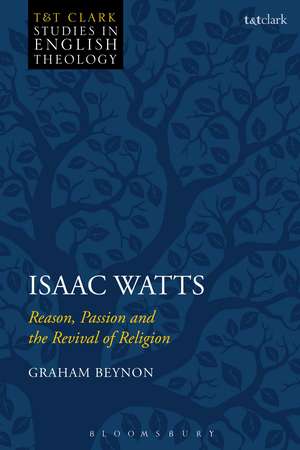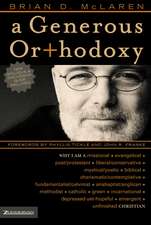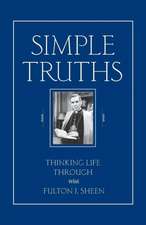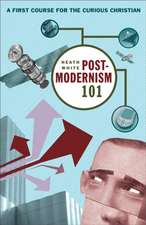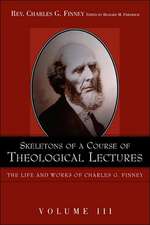Isaac Watts: Reason, Passion and the Revival of Religion: T&T Clark Studies in English Theology
Autor Dr Graham Beynonen Limba Engleză Paperback – 18 apr 2018
| Toate formatele și edițiile | Preț | Express |
|---|---|---|
| Paperback (1) | 237.02 lei 6-8 săpt. | |
| Bloomsbury Publishing – 18 apr 2018 | 237.02 lei 6-8 săpt. | |
| Hardback (1) | 831.43 lei 6-8 săpt. | |
| Bloomsbury Publishing – 19 oct 2016 | 831.43 lei 6-8 săpt. |
Din seria T&T Clark Studies in English Theology
- 14%
 Preț: 508.07 lei
Preț: 508.07 lei - 24%
 Preț: 188.99 lei
Preț: 188.99 lei - 21%
 Preț: 216.99 lei
Preț: 216.99 lei - 30%
 Preț: 509.45 lei
Preț: 509.45 lei - 13%
 Preț: 236.09 lei
Preț: 236.09 lei - 13%
 Preț: 222.93 lei
Preț: 222.93 lei - 21%
 Preț: 217.44 lei
Preț: 217.44 lei - 24%
 Preț: 195.91 lei
Preț: 195.91 lei - 23%
 Preț: 190.68 lei
Preț: 190.68 lei - 23%
 Preț: 191.13 lei
Preț: 191.13 lei - 23%
 Preț: 192.64 lei
Preț: 192.64 lei - 22%
 Preț: 510.60 lei
Preț: 510.60 lei - 28%
 Preț: 466.81 lei
Preț: 466.81 lei - 14%
 Preț: 512.69 lei
Preț: 512.69 lei - 30%
 Preț: 508.32 lei
Preț: 508.32 lei
Preț: 237.02 lei
Preț vechi: 305.37 lei
-22% Nou
Puncte Express: 356
Preț estimativ în valută:
45.36€ • 49.25$ • 38.10£
45.36€ • 49.25$ • 38.10£
Carte tipărită la comandă
Livrare economică 22 aprilie-06 mai
Preluare comenzi: 021 569.72.76
Specificații
ISBN-13: 9780567681218
ISBN-10: 0567681211
Pagini: 224
Dimensiuni: 156 x 234 mm
Greutate: 0.33 kg
Ediția:NIPPOD
Editura: Bloomsbury Publishing
Colecția T&T Clark
Seria T&T Clark Studies in English Theology
Locul publicării:London, United Kingdom
ISBN-10: 0567681211
Pagini: 224
Dimensiuni: 156 x 234 mm
Greutate: 0.33 kg
Ediția:NIPPOD
Editura: Bloomsbury Publishing
Colecția T&T Clark
Seria T&T Clark Studies in English Theology
Locul publicării:London, United Kingdom
Caracteristici
Maps out key areas of intellectual thought in the early 18th century
Notă biografică
Graham Beynon is Minister at the Grace Church in Cambridge, UK, and Director of Independent Ministry Training, Oak Hill College, London, UK.
Cuprins
IntroductionPart 1: Reason and PassionChapter 1: The Role of ReasonChapter 2: The Place of PassionChapter 3: The Art of PreachingPart 2: The Revival of ReligionChapter 3: The Art of PreachingChapter 4: The Need for PraiseChapter 5: The Method of PrayerConclusionBibliographyIndex
Recenzii
Beynon has produced an erudite, brilliant investigation into the work of Watts.
Isaac Watts the Dissenting hymnwriter was also an eighteenth-century intellectual who exerted a powerful influence over several generations through his extensive writings. His achievement, as Graham Beynon shows, was to build on his Puritan inheritance by engaging with contemporary thought so as to lay the foundations for the reformation of religion. In many ways he anticipated the concerns of the Evangelical Revival that took off in his later years.
Reason and passion and the relationship between them are key themes in the early eighteenth century. Graham Beynon has made a significant contribution in this area with this volume on reason and passion in the works of Isaac Watts. Beynon examines Watts's approach to reason and passion and the interconnections between those subjects and preaching, worship and prayer. His study makes a significant contribution to the understanding of English Dissent in the first part of the 18th century.
The theologian and hymn-writer Isaac Watts was one of the major shapers of eighteenth-century evangelicalism, yet he has received far less scrutiny than the Wesleys or Jonathan Edwards. Graham Beynon's book joins other recent studies by Isabel Rivers and Tessa Whitehouse in turning the spotlight onto Watts. He reveals a serious and consistent thinker, one who found a place for religious passion within the context of England's Protestant Enlightenment. What makes the book particularly useful is its judicious assessment of how Watts perpetuated and modified the Puritan tradition.
Isaac Watts the Dissenting hymnwriter was also an eighteenth-century intellectual who exerted a powerful influence over several generations through his extensive writings. His achievement, as Graham Beynon shows, was to build on his Puritan inheritance by engaging with contemporary thought so as to lay the foundations for the reformation of religion. In many ways he anticipated the concerns of the Evangelical Revival that took off in his later years.
Reason and passion and the relationship between them are key themes in the early eighteenth century. Graham Beynon has made a significant contribution in this area with this volume on reason and passion in the works of Isaac Watts. Beynon examines Watts's approach to reason and passion and the interconnections between those subjects and preaching, worship and prayer. His study makes a significant contribution to the understanding of English Dissent in the first part of the 18th century.
The theologian and hymn-writer Isaac Watts was one of the major shapers of eighteenth-century evangelicalism, yet he has received far less scrutiny than the Wesleys or Jonathan Edwards. Graham Beynon's book joins other recent studies by Isabel Rivers and Tessa Whitehouse in turning the spotlight onto Watts. He reveals a serious and consistent thinker, one who found a place for religious passion within the context of England's Protestant Enlightenment. What makes the book particularly useful is its judicious assessment of how Watts perpetuated and modified the Puritan tradition.
